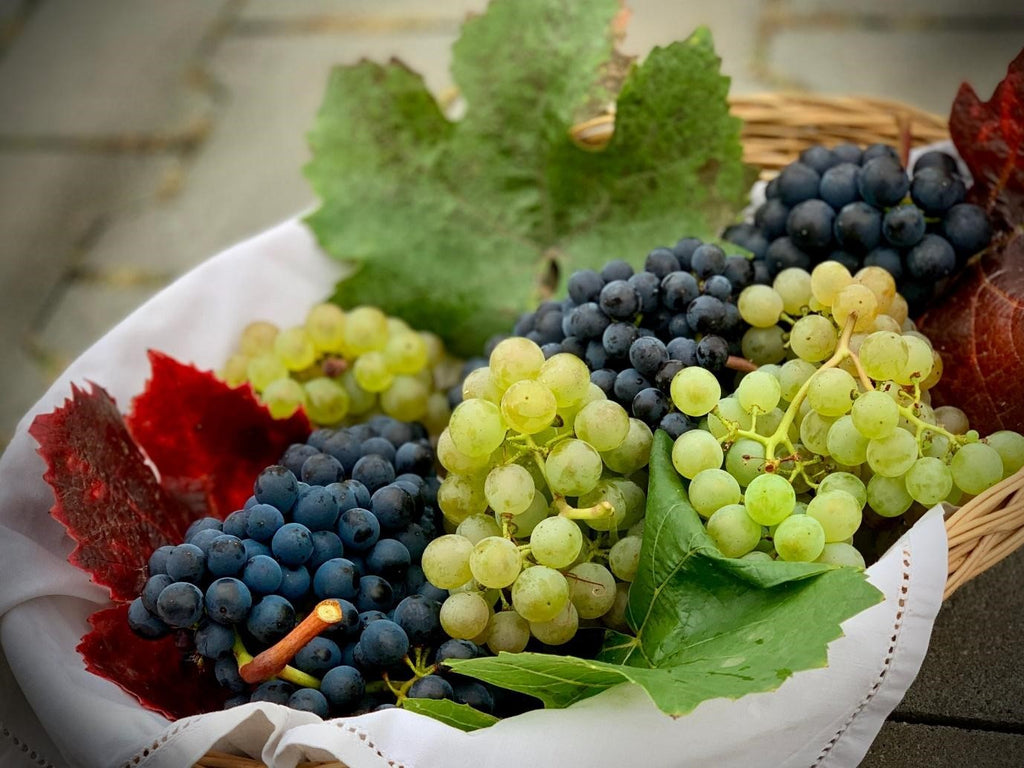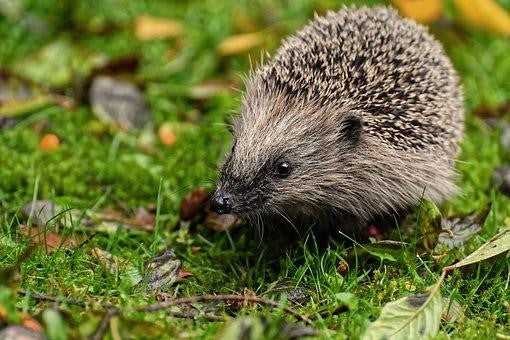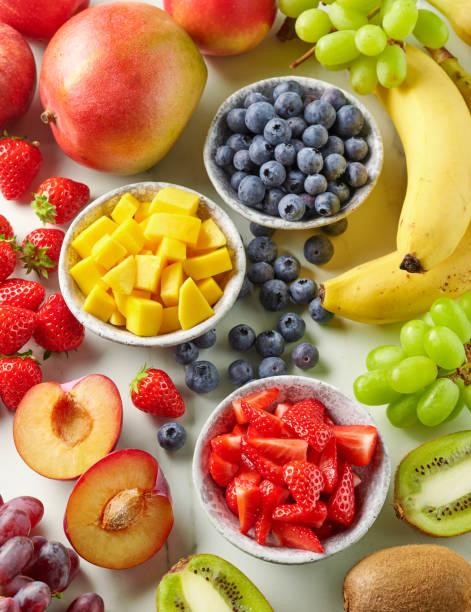
Grapes are packed with nutrients. They are loaded with vitamin C, a potent antioxidant that is essential for wound healing, and the development of connective tissues and the immune system. They also include potassium, which is needed for heart and kidney health, muscle contraction, and transmission of nerve signals, as well as vitamin K, which helps blood clot and maintain strong bones. The antioxidants found in grapes help defend body cells against oxidative stress, which has been linked to cancer, heart disease, and Alzheimer's disease. Darker grapes in particular, including the concord and purple kinds, are particularly strong in antioxidants.
Foods frequently contain grapes in them. When the entire fruit or an extract of the fruit, leaf, or seed is used as medicine, it might be safe with no adverse effects. Despite the aforementioned, grape consumption in high quantities may result in diarrhea. The many benefits of grapes justify the reason why pet owners would want to feed grapes to their pets. However, to provide answers to questions that any hedgehog owner might have regarding offering grapes to their pet, this article discusses the effects of feeding grapes to hedgehogs.
CAN HEDGEHOGS EAT GRAPES?
No, hedgehogs cannot eat grapes. Hedgehogs are omnivores but not all plant material is suitable for them to consume. Although grapes may appear to be harmless, many animals including hedgehogs can react negatively to them. Both grapes and raisins are poisonous to hedgehogs, and consuming either would call for emergency medical assistance.
The digestive system of a hedgehog cannot digest raisins and grapes, which results in negative effects if they are consumed. Additionally, certain pesticides applied to grapes can have a significant effect. Grapes can be bad for a hedgehog’s body, particularly for the kidneys, thus, hedgehogs should not consume grapes.

WHAT NUTRIENTS CAN BE FOUND IN GRAPES?
Grapes contain lots of nutrients, which are beneficial for hedgehogs but the quantity of these nutrients makes them harmful for hedgehogs to consume. The table below shows the quantities of different nutrients that 100 grams of grape possess.
|
NUTRIENTS |
QUANTITY |
|
Water |
81.3 g |
|
Energy |
67 kcal |
|
Protein |
0.63 g |
|
Fat |
0.35 g |
|
Carbohydrate |
17.2 g |
|
Fiber |
0.9 g |
|
Sugar |
16.2 g |
|
Calcium |
14 mg |
|
Iron |
0.29 mg |
|
Magnesium |
5 mg |
|
Phosphorus |
10 mg |
|
Potassium |
191 mg |
|
Sodium |
2 mg |
|
Zinc |
0.04 mg |
|
Copper |
0.04 mg |
|
Manganese |
0.718 mg |
|
Selenium |
0.1 µg |
|
Vitamin A |
100 IU |
|
Vitamin B6 |
0.11 mg |
|
Vitamin B12 |
0 µg |
|
Vitamin C |
4 mg |
|
Vitamin D |
0 µg |
|
Vitamin E |
0 mg |
|
Vitamin K |
14.6 µg |
|
Thiamin |
0.092 mg |
|
Riboflavin |
0.057 mg |
|
Niacin |
0.3 mg |
|
Cholesterol |
0 mg |
RISKS OF FEEDING GRAPES TO HEDGEHOGS.
- Grapes contain salicylic acid: Salicylic acid which is included in grapes could cause a hedgehog to suffer from an upset stomach. There is evidence of intolerance to this acid in hedgehogs, which manifests as inflammation, abdominal pain, diarrhea, and bloating. Grapes also have insoluble fiber, which might stimulate the digestive system.
- They can lead to diarrhea: Consuming foods high in sugar can lead to diarrhea. Grapes contain simple sugars, which might make hedgehogs who are prone to it experience diarrhea. Grapes can also lead to traveler's diarrhea- a type of diarrhea, which is typically known to be brought on by unpeeled fruits.
- Grapes may cause weight gain: Consuming grapes can drastically increase the calorie intake of hedgehogs. Hedgehogs are prone to obesity and due to their high-calorie content, grapes may cause weight gain to occur more quickly in hedgehogs.
- May lead to choking in hedgehogs: Choking in hedgehogs is a common issue, and uncut fruits and vegetables frequently lead to choking in hedgehogs. With grapes, the same might be true. Due to their size and form, grapes are one of the few foods that present a significant risk. The size of a grape is almost ideal for obstructing a hedgehog's airways, so it is not advisable to include grapes in a hedgehog’s diet.
- May Cause Allergies: Grape allergy, though uncommon, can be troublesome. Hedgehogs have been shown to experience severe allergic reactions when they consume a particular protein found in grapes, known as the grape lipid transfer protein. Additionally, grapes can lead to anaphylaxis, a potentially fatal condition.

CAN HEDGEHOGS EAT OTHER FRUITS?
Yes, hedgehogs can eat other fruits. Some of the fruits that are recommendable for hedgehogs to consume include:
Melon: Melon is beneficial to hedgehogs when consumed in moderation. Melons are extremely useful to the body in the summer because of their high water content.
Strawberries: The sugar level of strawberries is quite low. Strawberries are a safer choice for a hedgehog than other fruits, which need to be watched due to their high sugar content. You can give them a lot of these fruits without worrying.
Apples: Apples are rich in phytochemicals and vitamins. For three to four days, a hedgehog can eat an apple without getting sick. If apple consumption rises, there is a chance that a hedgehog could consume too much sugar, which could lead to issues like obesity, so hedgehogs should only consume apples moderately.
Pears: Pears are a source of nutrients like fiber. These nutrients are crucial for the body's healthy operation. Pears should not have skin on them while being given to your hedgehog. To make the pear more palatable to the hedgehog, cut it into little pieces.
Berries: Blueberries and raspberries are examples of berries. Antioxidants included in berries protect against aging and disease. Before offering your hedgehog any berries, wash them thoroughly and remove any skins (for blueberries), to ensure that they do not get sick from any chemicals the berries have been sprayed with.
Bananas: In hedgehogs, bananas can result in excessive blood sugar levels. However, it is okay to offer it to them in moderation. Vitamins C and B6, manganese, folate, and potassium are all abundant in bananas. Both the immune system and blood regulation are strengthened by them. To make the bananas easier for the hedgehog to consume, it is advisable to mash them.
CONCLUSION.
Even though we humans are capable of eating a wide range of fruits, not all mammals are. You can give your hedgehog a large range of foods, but moderation and safety are vital. This is particularly true for hedgehogs, which can develop life-threatening illnesses from eating grapes. Any food that poses a choking risk, including grapes and raisins, should be avoided at all costs. Hedgehogs shouldn't eat grapes and should stay away from citrus fruits with a high acid content, such as oranges, pineapple, and lemons. It is advisable to consult a veterinarian before modifying a hedgehog's diet.



